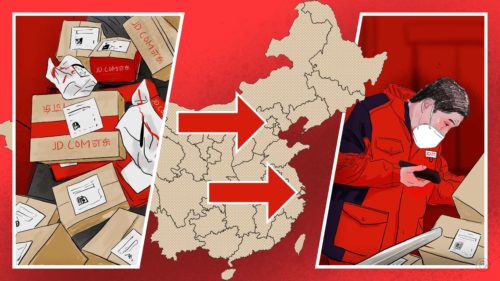Hundreds of prisoners infected with COVID-19
The latest official numbers on the COVID-19 epidemic are: 76,798 confirmed cases and 2,250 deaths.
China remains the only seriously affected country, but there have been spikes in South Korea and Japan, which now have 204 and 105 cases, respectively. The news caused a drop in oil prices (Bloomberg, porous paywall).
China changed how it counts coronavirus cases again, citing “improved testing capacity,” but the move seems to have only added to public confusion and mistrust in the official numbers, per CNN. Meanwhile, Financial Times reporter Yuan Yang today tweeted:
Oh oh. Hubei’s new party chief has ordered officials [in Chinese] to stop making alterations to the confirmed coronavirus case count, and to add back all the cases that they had removed over recent weeks. Another spike in cases tomorrow?
There are “hundreds of new coronavirus cases in Chinese prisons,” according to a government announcement, reports the New York Times (porous paywall, or see this NPR story):
At least 500 prisoners and guards, in at least four different prisons across three provinces, had been infected with the virus, officials announced on Friday. More than 200 have been detected in one prison in the city of Jining, 450 miles east of Wuhan, the city at the center of the epidemic. Officials suggested that the Jining outbreak may have been tied to a coughing prison guard who turned out to be infected.
Beijing has sent a team of “top investigators” to find out what happened in the prisons, reports the South China Morning Post.
“Half of China’s malls remain shut a month after retailers began closing their doors at the start of the Lunar New Year holidays [but] stores selling necessities are opening at a significantly higher rate,” reports Bloomberg (porous paywall).
“China’s chicken farmers had been looking forward to a bumper year,” as pork shortages continue to drive demand for chicken, says Reuters. But COVID-19 has upset the flow of a time-sensitive supply chain “that starts with the sale of day-old chicks by hatcheries to breeding farms, continues with distribution of broiler chickens to growers, and ends in the slaughter of fattened birds.”
China is set to clamp down permanently on wildlife trade, according to Nature. “Next Monday, the Standing Committee of the National People’s Congress, the country’s highest decision-making body, will meet to decide how the trade in wildlife products should be regulated in the long term.” The Environmental Protection Agency, a nonprofit, has “prepared comments and specific recommendations (in English and Chinese) to urge positive changes for wildlife.”






